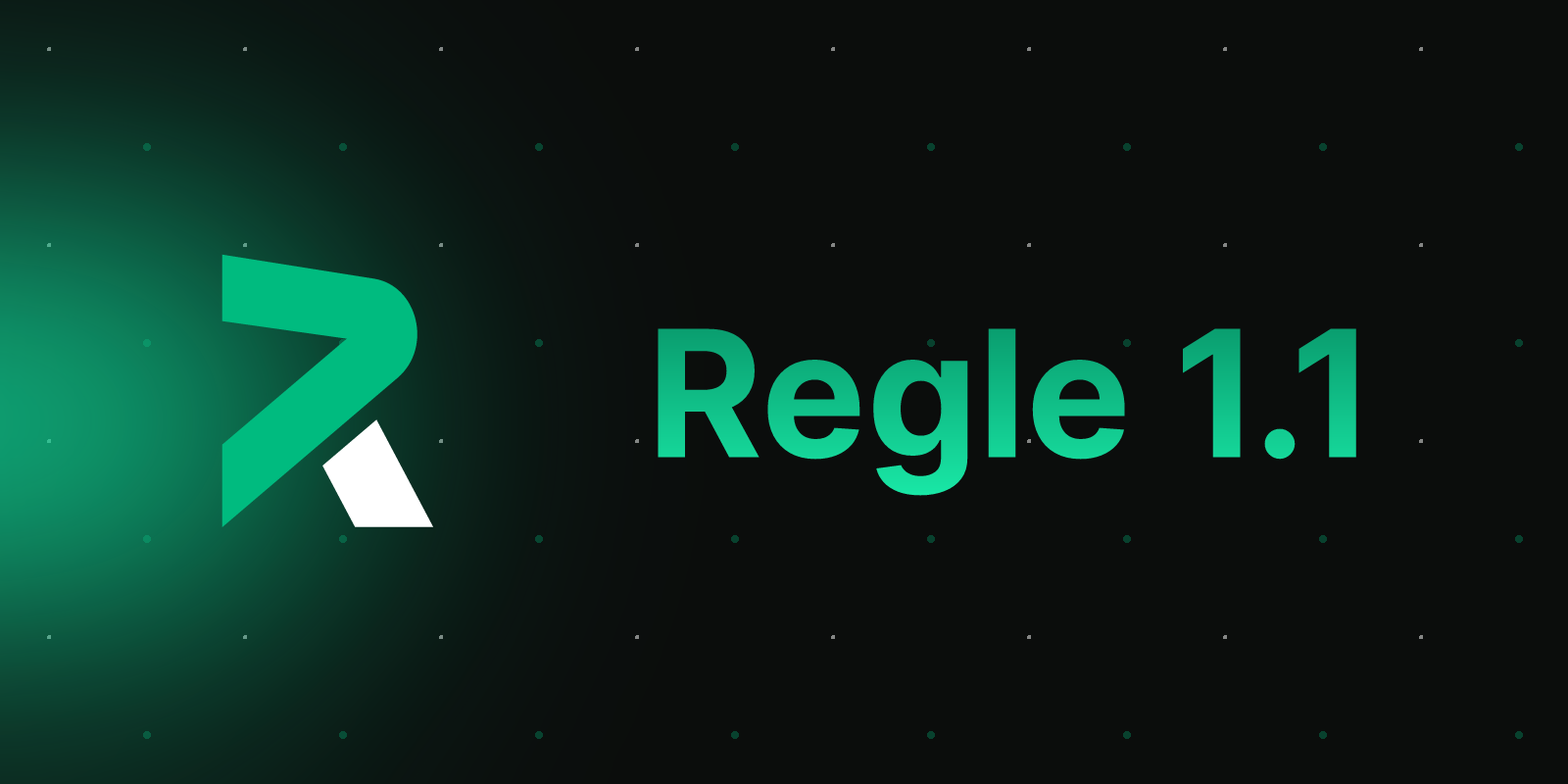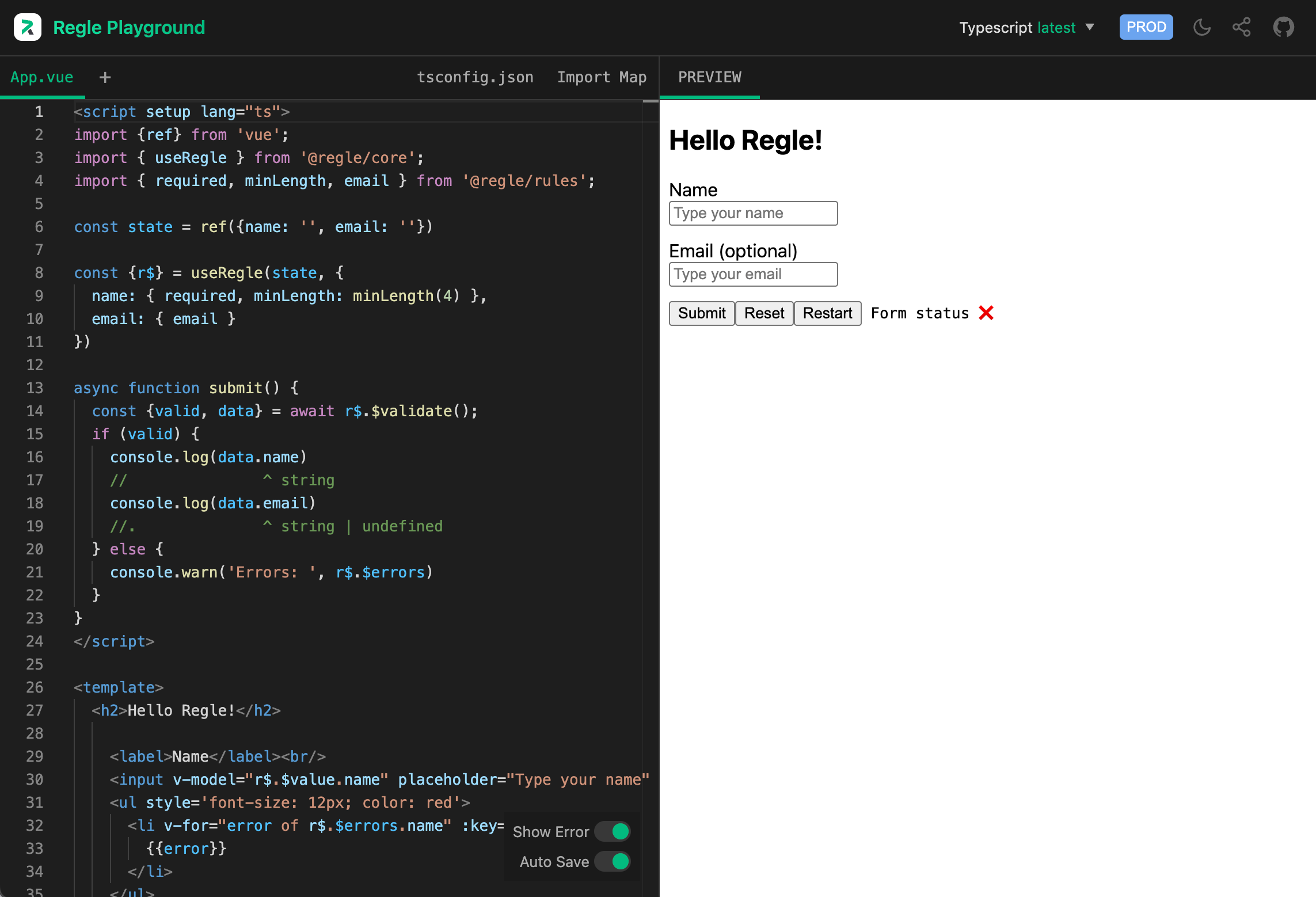Announcing Regle 1.1 🎉

I'm happy to announce that a new minor release of Regle is out, bringing exciting new features.
Regle has been on 1.0 for 1 month now and have reached
- 124 stars ⭐️
- 100k npm downloads
A big thanks to anyone using Regle in the early stages, helping me find and fix edge cases and add more useful features.
For those who are discovering this library with this blog post, Regle is a type safe and headless form validation library made for Vue.
It's entirely data-driven, allowing the validation logic to mirror your data structure, enabling a clear separation between the UI and validation logic.
I consider it the successor of Vuelidate.
▶️ Regle playground
A Regle online playground is now available at https://play.reglejs.dev !
It provides the same features as the Vue playground while being focused on Regle.
It will make it easier to prototype or to report bugs.

🔃 Variants and discriminated unions support
Your form may not be linear, and have multiple fields that depends on a condition or a toggle. It can be complex and become a mess when trying to organise your types around it.
Regle variants offer a way to simply declare and use this discriminated unions, while keeping all fields correctly types and also runtime safe.
<template>
<div v-if="narrowVariant(r$, 'type', 'EMAIL')">
<!-- `email` is a known field only in this block -->
<input v-model="r$.email.$value" placeholder='Email'/>
<Errors :errors="r$.email.$errors"/>
</div>
<div v-else-if="narrowVariant(r$, 'type', 'GITHUB')">
<!-- `username` is a known field only in this block -->
<input v-model="r$.username.$value" placeholder='Email'/>
<Errors :errors="r$.username.$errors"/>
</div>
</template>
<script setup lang='ts'>
import { useRegle, createVariant, narrowVariant } from '@regle/core';
const state = ref<FormState>({})
const {r$} = useRegle(state, () => {
const variant = createVariant(state, 'type', [
{type: { literal: literal('EMAIL')}, email: { required, email }},
{type: { literal: literal('GITHUB')}, username: { required }},
{type: { required }},
]);
return {
firstName: { required },
...variant.value,
};
})
</script>Check out the documentation for variants
✅ InferSafeOutput type to infer safe form values
Like Zod's Infer utility, Regle now provide its own shortcut for extracting safe output from any r$ instance.
import { useRegle, InferSafeOutput } from '@regle/core';
const { r$ } = useRegle({ firstName: '', lastName: '' }, {
lastName: { required },
});
type FormRequest = InferSafeOutput<typeof r$>;🦸 Support Zod 4
Zod 4 is currently in beta, and Regle officially supports it.
Some bugs on Zod side may persists, but breaking changes are minimal.
Nothing is to change on Regle side.
📞 Allow rules with optional parameters to be used without function call
This is a thing that was bugging me for a while: rules that add an optional parameter still had to be used by a function call.
Ex:
import { macAddress } from '@regle/rules';
const { r$ } = useRegle({address: ''}, {
address: {
macAddress: macAddress()
}
})This also applies to custom rules and it was not convenient.
With this update, when the option of a rule is optional, the rule can be used without calling it.
import { macAddress } from '@regle/rules';
const { r$ } = useRegle({address: ''}, {
address: {
// Can now be written inline
macAddress,
// But can still can be called with arguments
macAddress: macAddress('::')
}
})👯♀️ Possibility to extend already created useRegle from defineRegleConfig with extendRegleConfig
If you have a shared custom useRegle, you may want to add even more rules or shortcuts to it. This was not possible with defineRegleConfig.
@regle/core now exports a new helper called extendRegleConfig.
import { extendRegleConfig } from '@regle/core';
const { useRegle: useExtendedRegle } = extendRegleConfig(useCustomRegle, {
rules: () => ({
customRuleExtended: withMessage(required, 'Custom rule 2'),
})
})Check out the docs here
🔣 allowSymbol option in alphaNum and alpha rules
Allowing rules with optional parameters to be used without function call was motivated by the fact that I had to add options to alpha and alphaNum, but would require a breaking changes in declaration.
Both rules have now optionals options, including allowSymbols.
import { alpha, alphaNum } from '@regle/rules';
const { r$ } = useRegle({ name: '' }, {
name: {
alpha: alpha({ allowSymbols: true }),
alphaNum: alphaNum({ allowSymbols: true }),
})👴 Dropped CommonJS support
Regle supported ESM & CJS builds, but after reading Antfu's article on shipping ESM only, I decided to remove CJS support.
Full details
🚨 Breaking Changes
- Rename
ipAddressrule toipv4Address#91
🚀 Features
InferSafeOutputtype to infer safe form values- Variants and discriminated unions support #82
- Allow rules with optional parameters to be used without function execution #96
- Zod 4 support
- Dropped CommonJS support
- Possibility to extend already created useRegle from defineRegleConfig with
extendRegleConfig#83 - Symbol option in
alphaNumandalpharules #89

